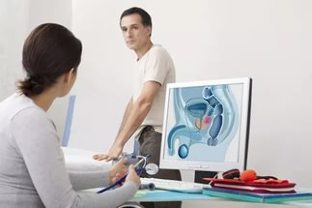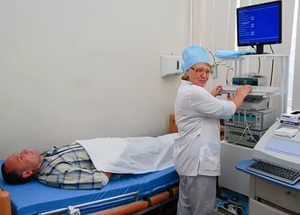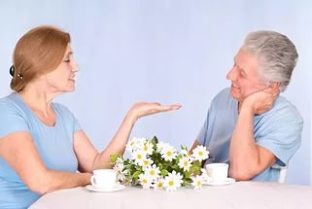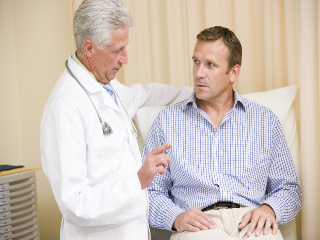
Inflammation of the prostate is a common reason for a man to go to a urology clinic.
Treatment of prostatitis consists in identifying the cause of the disease and prescribing special drugs to improve the functioning of the prostate.
In addition, an active lifestyle, regular exercise and physical therapy play an important role in therapy.
Even urologists have nothing against treating prostatitis according to traditional medical prescriptions. In order to avoid exacerbation of the disease, it is better to use it at the same time as drug therapy.
Prostate inflammation is caused by:
- congestion in the pelvic area due to a sedentary lifestyle;
- sexually transmitted diseases;
- urinary tract infections;
- prolonged abstinence from sex;
- interruption of traffic;
- Complications after urethral catheterization;
- constant hypothermia;
- abuse of alcohol, spicy and spicy food;
- Infections of other organs (for example, tonsillitis, sinusitis, pneumonia, tooth decay) against the background of weakened immunity.
Acute and chronic prostatitis are differentiated according to the type of flow.
Depending on the etiological factor, a distinction is made between the following forms of the disease:
- Acute bacterial prostatitisis mainly caused by gram-negative pathogenic microflora. These are E. coli (Escherichia coli), Gonococcus (Neisseria gonorrhaeae), Trichomonas (Trichomonas vaginalis).
- Chronic bacterial prostatitisis diagnosed in almost 30% of cases. The main cause is infection with chlamydia (Chlamydia trichomonas), Ureaplasma (Ureaplasma urealyticum), and Mycoplasma (Mycoplasma). The disease can occur both independently and as a complication of the acute form of the inflammatory process of the prostate.
- Granulomatous prostatitisis relatively rare. It is caused by syphilis, genital tuberculosis, and fungal infections.
- Chronic non-bacterial prostatitisoccurs in the vast majority of cases in men over 50 years of age. The main cause is age-related circulatory disorders.
The secret of the prostate has some antimicrobial activity and effectively copes with the infection.
Therefore, the development of bacterial pathology usually occurs in the presence of congestion in the genital area. For this reason, some experts consider bacterial prostatitis to be the initial stage of non-infectious chronic inflammation.
The acute form of the disease is usually accompanied by the following symptoms:
- a feeling of heaviness in the perineum, especially when sitting;
- increased urination, sometimes they are wrong due to the compression of the urethra by an enlarged gland;
- difficult, painful urine flow;
- pain in the perineum radiating to the penis and anus;
- sensation of the presence of a foreign body in the rectum;
- pain when defecating;
- Temperature rise to 38 - 40 degrees.
If the treatment of acute prostatitis is started quickly, the patient's condition will improve after 3-4 days. However, in the absence of adequate therapy, there is a risk of developing a purulent abscess of the prostate. This requires immediate medical attention in a hospital. The following are the signs of chronic prostatitis.

Pain. It is diverse and can occur during urination, ejaculation, or at rest. The intensity depends on many factors. Sometimes a man only complains of a feeling of heaviness, and in some cases pain medication is needed. The localization of pain is also different - in the perineum, in the glans, in the testicles or in the rectum.
Urinary tract diseases.This is a common urge to go to the bathroom, especially at night, a sluggish, intermittent flow of urine, a feeling of inadequately emptied bladder. Sexual dysfunction manifests itself in the form of early ejaculation or a weakening of the erection.
Mental symptoms.Patients complain of insomnia, increased sweating, irritability and easy fatigue. These signs appear in the remission phase and worsen during the activation of the process. Experts emphasize that a distinction must be made between prostate adenoma and inflammation.
Adenoma is benign hyperplasia (enlargement) of an organ. This disease is associated with age-related changes in the hormonal background of men and requires the consultation of an andrologist. The doctor treats prostatitis by prescribing drugs for local (suppositories) and systemic use (pills and injections for the acute course of the disease).
The therapy focuses on:
- stop bacterial activity;
- improve microcirculation and blood circulation;
- elimination of edema;
- termination of the inflammatory process;
- normalization of the outflow of secretions from the prostate;
- improving the immune system;
- if necessary - correction of hormonal disorders.
According to patient reviews, the effectiveness of drug treatment of prostatitis increases with the simultaneous consumption of decoctions and tinctures from various medicinal plants:
- pumpkin seed oils;
- parsley leaves, roots and fruits;
- beekeeping products (honey, propolis, bee bread, zabrus);
- aspen bark;
- celandine juice;
- chestnut peel;
- Hemlock tinctures.
Juice therapy has been gaining popularity recently. This technique helps cleanse the body of toxins, strengthen the immune system, normalize the intestines, liver and kidneys, and stabilize weight. In addition to treating prostatitis, juice therapy helps with many other chronic diseases. Details on this method can be found on dedicated forums.
Treatment of prostatitis in men: drugs and their principle of action
In addition to physical therapy procedures such as transrectal massage of the prostate, thermal microwave therapy and the treatment of prostatitis in men, the following groups of drugs are prescribed:
- antibiotics;
- nonsteroidal anti-inflammatory drugs;
- herbal and biological preparations;
- angioprotectors and vasodilators;
- α-blocker;
- antispasmodics;
- 5-α-reductase inhibitors;
- immunomodulators.
Antibacterial drugs for the treatment of prostatitis in men are almost always prescribed, regardless of the form of the disease. That is not completely right.
The usefulness of using antibiotics should be confirmed by laboratory tests.Perform the so-called bacterial culture of prostate secretions. The study reveals not only the presence or absence of a pathogenic microflora, but also its sensitivity to certain antibacterial drugs.
The duration of therapy is 2 to 4 weeks, if necessary it can be continued for another month.When prescribing a drug, consider its ability to build up in the tissues of the prostate. This property has fluoroquinolones, antibiotics of the group of penicillins, lincosamides, tetracyclines, macrolides. Sometimes antimicrobial therapy is also indicated when there is a risk of complications from non-infectious prostatitis with a bacterial infection. The dosage of drugs is calculated individually based on the age, condition of the patient and the presence of concomitant diseases of the kidneys, liver and digestive tract.
To treat acute prostatitis in men, doctors prefer injections, then switch to pills. Nonsteroidal anti-inflammatory drugs (NSAIDs) are used to relieve pain and edema.The effect of the drugs is based on the inhibition of prostaglandin synthesis and platelet aggregation - the main factors for the development of the inflammatory process and the associated pain, fever and swelling.
In the treatment of prostatitis in men, the drug is suitable for topical application in the form of suppositories. This ensures rapid absorption and maximum concentration of the active ingredient in the organ. Antispasmodics and α-blockers make urination easier when the prostate is inflamed. Experts associate difficulty emptying the bladder not only with the mechanical compression of the urethra caused by an enlarged prostate.
The cause of this symptom is also a reflex spasm of the smooth muscles of the urinary tract. Difficulty urinating or an incompletely emptied bladder can cause secondary bacterial infections, sand buildup, and stone formation. The effects of adrenergic blockers develop gradually. Almost 90% of patients notice an improvement 1-2 weeks after starting treatment. Antispasmodics "work" a little faster and they also relieve pain.

Phytopreparations and medicines based on the secretion of the prostate of cattle in the form of tablets or suppositories have a complex effect. They are not as effective as synthetic medicines.
To treat prostatitis in men, phytopreparations are used either as part of complex therapy or in remission to prevent the disease from getting worse.Angioprotectors can be used in the form of capsules or ointments for external use. Their action is aimed at normalizing blood flow to the prostate. Improving venous outflow helps eliminate inflammatory exudate early and eliminate swelling.
Immunomodulators for the treatment of prostatitis in men are used to strengthen the body's defenses. The fact is that the weakening of immunity plays an important role in the development of inflammation, in this condition the risk of various bacterial complications increases. Thymus supplements, interferons, and stimulants of their own immunity are widely used.
In addition, multivitamin complexes are used to treat prostatitis in men(which drug the patient chooses depending on the price and manufacturer). If the nervous tension is strong, insomnia, mild sedatives and antidepressants are indicated. If an ultrasound scan of the organs of the urinary system has shown a build-up of sand in the kidneys, appropriate drugs are selected to prevent stone formation.
How to treat prostatitis at home: diet, exercise, recipes for traditional medicine
The prostate is the main organ of the male reproductive system, so many are interested in the question of the need for hormonal therapy in the development of the inflammatory process. Experts agree that such drugs are necessary only when the main therapy for advanced prostatitis has no effect. In particular, they apply:

Preparations of the glucocorticoid group. To reduce side effects and systemic exposure, they are prescribed topically using electrophoresis.
inhibitors5-αreductase. Drugs in this group are not hormones. Their mechanism of action is based on reducing the effects of androgens on the prostate. Thus, the reduction in the size of the organ and the relief of the symptoms of prostatitis are ensured.
Testosterone to improve sexual function. They are extremely rarely prescribed for medical reasons and after blood tests for the content of the main hormones. Doctors advise increasing the effectiveness of drug therapy and reducing its duration with the help of funds from the arsenal of traditional medicine.
How to treat prostatitis according to folk recipes:
- Peel the chestnuts, peel them finely and cover with a glass of vodka. Insist in a cool dry place for 14-20 days. Then strain and add 100-150 ml of clean water at room temperature. Take 10 drops twice a day on an empty stomach for 2 weeks. Then you need to take a seven-day break and repeat the course of treatment.
- Pumpkin seed oil is recommended to drink a tablespoon before each meal.
- Heat a glass of vegetable oil in a water bath and add 2 tbsp. Crush the propolis and continue heating until it is completely dissolved. Use the resulting mixture as an ointment once a day at bedtime. The duration of treatment is 28-30 days.
Regular prostate massage has a good effect. You can do it yourself, ask for the help of a loved one, or use one of the specialty devices among the variety available in the modern market. A contraindication to massage is the formation of stones in the prostate (calcareous prostatitis).
Such a procedure is also not recommended if the disease worsens, which is accompanied by pain and fever. In addition, exercise helps in deciding how to cure prostatitis. Moderate physical activity is an excellent way to prevent pelvic congestion and help combat obesity.
Urologists recommend performing the following elements of gymnastics:
- Kegel exercises consist of rhythmic tension and relaxation of the muscles of the perineum. They have to be done at least 30 times 3 to 4 times a day.
- Walking up stairs or lifting knees to your chest while standing.
- squats.
- "birch".
- Raise your legs on the bar.
You can also take video yoga lessons.Reverse asanas and breathing exercises help in curing prostatitis. However, this does not mean that you can continue to lead a sedentary lifestyle after exercising. For the effective prevention of prostatitis and impotence, experts recommend that the stronger sex move as much as possible.
Hirudotherapy is a good complement to conventional methods of treating diseases. The course includes 8 - 9 procedures. It is better to start them in the early stages of an acute inflammatory process.
The effectiveness of the manipulation is based on the following factors:
- During the procedure, leeches release the substance hirudin, which thins the blood and makes it easier to circulate.
- edema disappears due to the excretion of inflammatory exudate;
- Reflex effect on the active points in the pelvic and genital area.
Treating prostatitis is almost impossible without proper nutrition. It is necessary to refrain from alcohol, spicy, smoked, spicy and salty foods. Juices made from green vegetables (especially spinach, herbs), lean meat, and fish should be preferred. Drink plenty of fluids (water, compotes, fruit drinks).
Zinc is suitable for all ages. This mineral stimulates spermatogenesis and improves the quality of male semen. It is found in large quantities in beef, pine nuts, peanuts, and legumes.
Despite the best efforts of doctors, it is impossible to cure advanced forms of non-bacterial or infectious prostatitis with severe edema and pain with the help of drugs and physical therapy. In such cases only surgery will help. To avoid this, you need to monitor your weight and practice age- and health-appropriate sports. It is also necessary to avoid hypothermia to prevent chronic infections from developing.
Drugs for the treatment of prostatitis
The selection of drugs for the treatment of prostate inflammation requires an individual approach. When prescribing drugs, the doctor must take into account the presence of contraindications, the features of the course of the disease and the cost of drugs for the treatment of prostatitis.
As you can see, the range of drugs used to treat prostate inflammation is wide. However, high costs don't always mean efficiency. Only a doctor should choose drugs for the treatment of prostatitis and their dosage. Before using traditional medicine with honey or herbs, it is also necessary to consult a specialist.
Draw conclusions
Prostatitis is one of the most common male diseases in the world. But few people know that seven out of ten men who have prostatitis die from prostate cancer.
What is particularly frightening is the fact that the majority of men completely ignore the symptoms of prostatitis and when they turn to doctors they can no longer help.
Symptoms of prostatitis:
- Drawing or cutting pain in the lower abdomen, scrotum or perineum
- Frequent urination, burning sensation in the urethra
- Feeling "not completely emptied bladder
- Difficulty urinating (weak current)
- Deterioration in the duration and quality of the erection
- Premature ejaculation or problems getting it
- Increased body fatigue and irritability
Even one of these symptoms should make you wonder. And if there are two of them, then don't doubt it - you have prostatitis.
























